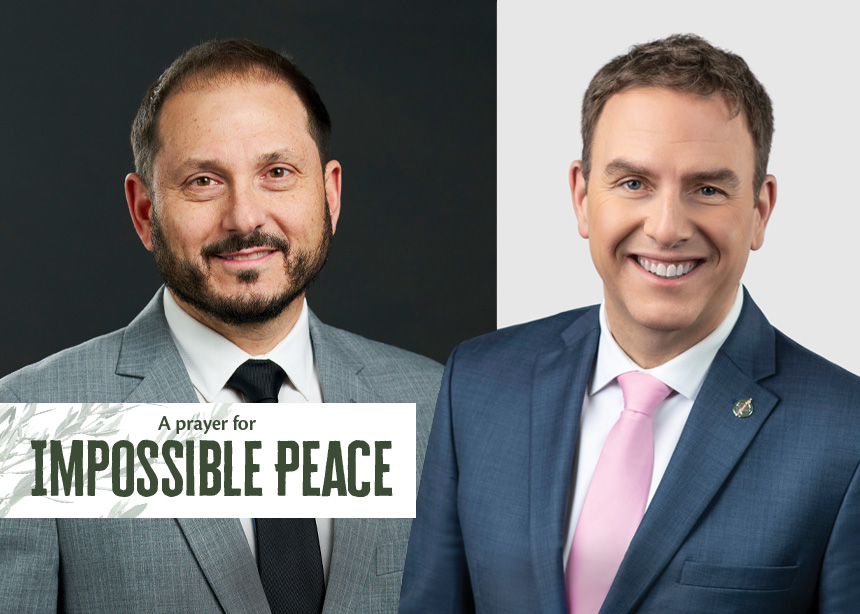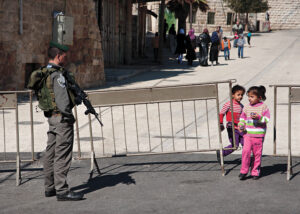An interview with Gustavo Zentner
By Will Braun
Gustavo Zentner will never forget visiting areas attacked by Hamas.
“We walked into the homes where you can still smell the smell of burned flesh,” he recalled. “That smell will always accompany me.”
Zentner travelled to Israel last November as part of a solidarity mission comprised of about 60 Canadians, including five MPs. Zentner, who now works for the Centre for Israel and Jewish Affairs (CIJA) as vice president for Manitoba and Saskatchewan, saw bloodstains, remnants of a crib and bullet holes from shots taken at people who were hiding.
“It was shocking, walking into an area where such a barbaric attack was perpetrated against civilians,” he said during a video call from his Winnipeg office. “It broke my heart to pieces, families broken forever.”
Zentner served as president of the Jewish Federation of Winnipeg at the time, prior to assuming his new role with CIJA, the primary Jewish lobby group in Canada.
Jewish people around the world will remember October 7 as Black Saturday “for generations to come,” he said.
Addressing hate
The new CIJA office for Manitoba and Saskatchewan is a response to increased antisemitism in Canada since October 7. “In my role with CIJA, we stand against all forms of hate and discrimination,” Zentner said.
His aim is to build partnerships and open dialogue with various organizations, including faith-based organizations, ethnic groups and community groups. The goal, he said, is “to ensure that we all look after each other and to ensure that we denounce all forms of hate.”
He noted the significant amount of Islamophobia as well.
Given the spread of hate online, Zentner sees the need for a strategy to increase online literacy among youth and find ways to protect them from hate online. He will also focus on universities, where he says there is “a significant level of antisemitism and Islamophobia.”
Zentner’s work is guided by the Jewish teaching of Tikun Olam, a Hebrew term which means “repairing the world—making the world a better place, one deed, one action at a time.”
Gaza
The Gaza war shapes much of the context of Zentner’s work. He critiques media narratives that fail to acknowledge the “barbaric” and “horrific” nature of the October 7 attack. He also said few media reports clearly articulate and emphasize the fact that Hamas started this war. “We had a ceasefire on October 6,” he stated.
Zentner wants Canadians to understand that, throughout its existence, “Israel has been under direct attack. . . . Most of us in the rest of the world don’t know what it is like to be under constant bombardment.”
He noted that, unlike in Canada, where basements are common, in Israel, homes, schools, community centres and other buildings have bomb shelters in case of rocket attacks. It is part of the construction code.
The goal of the current military campaign is to “retrieve Israeli hostages,” Zentner said, adding that the high value placed on human life in the Jewish tradition has helped the Jewish people remain focused on the primary task of bringing home the hostages.
Zentner said that in the Jewish faith, if you save one human life it is as if you have saved all of humanity, and the loss of a single life is like losing all of humanity. “It is core to our Jewish identity, the preservation of any human life.”
It is “incumbent upon the government of any nation to defend its citizens,” he said.
He acknowledged the damage that has resulted from the Gaza war. “The suffering is not just in Israel,” he said, “[there is ] a lot of suffering in Gaza, which I acknowledge, which I feel for,” noting again that Israelis were the “first victims” in the current conflict.
“It’s devastating to see people, especially innocent civilians, die when there is a military campaign. In the case of Gaza, it happens when . . . Hamas hides among civilian populations.”
“There’s no possible way of justifying any loss of any human life. . . . Of course, we would want to see no casualties,” he added. “We didn’t need this war. We didn’t start it.”
Zentner said that peaceful resolution would probably involve a two-state solution, but first Hamas would need to return the hostages and surrender themselves. “My prayers are for a prompt, peaceful resolution, which starts with the safe return of the hostages,” he said.
People don’t have to agree with the government of Israel, but they should not “deny people’s identity to their homeland and to their right to self-determination and self-defense,” Zentner said.
“You can be pro-Palestinian, . . . you can stand up for your own beliefs without having to threaten Jewish people, without having to deny the Jewish people’s ancestry and indigenous connections to the land of Israel.”
Q&A with Richard Marceau
By Madalene Arias
Richard Marceau serves as vice president, external affairs and general counsel at the Centre for Israel and Jewish Affairs. He previously served as a Member of Parliament with the Bloc Québécois. This interview has been edited for length and clarity.
Q: Can you explain Zionism?
A: Zionism is the belief that Jews are a nation. Like all nations, they have a right to self-determination. In this case, the right to the ancestral lands of the Jewish people. To me, that is what Zionism is. It has nothing to do with where the border should be, whether it should be here or there. It’s simply a right, simply a belief of the Jewish people to have self-determination in their ancestral lands.
Q: Can you describe the concerns that protests in Canada since October 7 have created for the Jewish community?
A: Freedom of expression is a central tenet of any liberal democracy, so it is something that we support. But there are limits. One is, of course, hate speech; and two, is where it leads to trying to intimidate the Jewish community.
For example, if there’s a demonstration in front of Parliament or in front of the Israeli consulate in Toronto or Montreal, that is fair game.
If you are demonstrating in front [of], or close to, the Jewish community, where there is no Israeli presence, or if it’s by a Jewish restaurant, that’s something completely different.
Where there has been violence and crime has been quite worrisome. You saw the use of bomb scares in Jewish schools in Toronto; you saw Jewish schools shot at in Montreal; you saw the molotov cocktails thrown at Jewish institutions and Jewish synagogues.
There has been a terrorist plot that was stopped in Ottawa, in my own community, because of the work of the RCMP and other law enforcement agencies. So the Jewish community is very afraid.
Q: What do people misunderstand about Israel and its supporters?
A: I think there is a group of people who will try to tar as evil anybody who supports the right of Israel to exist in peace and to defend itself. So all this talk about apartheid state, inherently racist, or inherently evil Israel, is very troubling. Some of it comes from the far right, some of it comes from the far left. Some of it comes from members of different religious communities. The Mennonite church has not been immune to those types of problematic statements in the past.
There is a double standard that is applied to Israel that is not applied to any other country.
Q: What is the double standard?
A: What is expected of Israel is not expected of any other country. I’ll give you a very quick example; there were 400,000 people who died in the civil war in Syria—thousands of refugees. I don’t remember the streets of Toronto, Montreal, Ottawa, Vancouver being filled with people saying, “Let’s protect the Syrians.”
Q: What would you say to members of the public who just can’t tolerate the destruction and human suffering in Gaza?
A: One, I share that. Two, I wish to see that stop, but there will be conflict again if Hamas is left standing.
Let’s say it stops tomorrow. That means Hamas, as it said itself, will try to redo it again. Is that what we want? Do we leave Hamas in power when it openly says, “We will attack Israel again”?
A ceasefire now with Hamas in power means more death, more destruction or more conflict.
The other thing is that the level of destruction, when Hamas built tunnels, is a side effect, where it uses mosques, and schools, and hospitals as military bases—under international humanitarian law, that makes those buildings legitimate targets. That’s unfortunate. You don’t do this.
Related articles:
A prayer for impossible peace
Understanding absolutist views
Mideast dialogue programs fall short
Mennonite Action: Arrests at peaceful protest
A modest proposal








Leave a Reply
You must be logged in to post a comment.